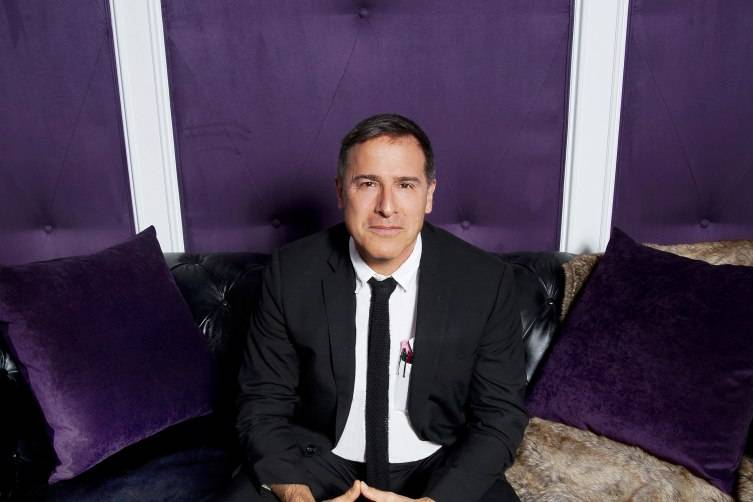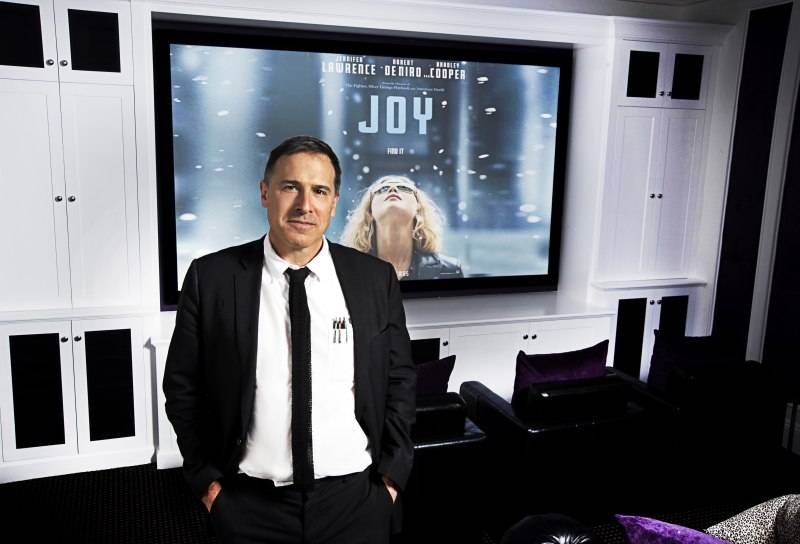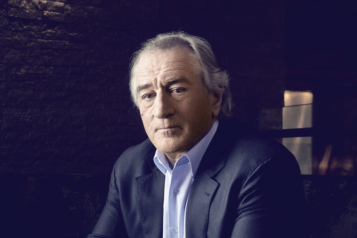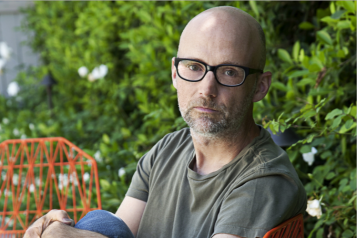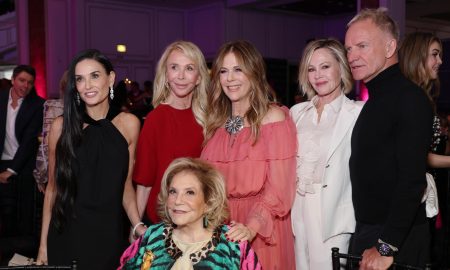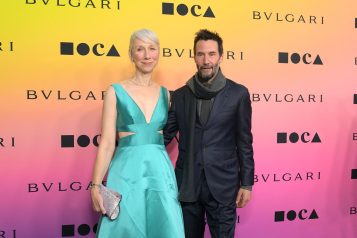Having a conversation with David O. Russell is kind of like speed dating: he’s on to the next topic before the buzzer even goes off.
Case in point: it’s been only ten minutes since the five-time Oscar nominee walked onto the set of our shoot in Pacific Palisades, and we’ve already covered topics ranging from Winston Churchill to Felicity Huffman’s change of hair color to The Nutty Professor. The 1996 film is one of his favorites, which could be why, on this particular day, he is channeling an inquisitive professor. Though he’s in his standard uniform of a blazer, button-down, skinny tie, sneakers and trousers (he made it a rule to stop wearing jeans in his 30s), three pens poke out of his left pocket.
Suffice it to say, the 57-year-old director of recent Academy Award-nominated films such as Silver Linings Playbook, American Hustle and The Fighter is intensely curious. He’s interested in and asks a plethora of questions about the backstory of everyone around him. What does his tattoo mean? Where is she from? What is it like dating someone in politics? It’s almost as if he’s mentally saving the information, like the scribbled script idea on pink notepaper that he carries around in his pocket, just in case it might be useful for a film on the human condition (his specialty) down the line. Or maybe he is storing the information to share with the students he mentors at the Ghetto Film School, an educational nonprofit that gives a diverse group of disadvantaged students hands-on-training in filmmaking.
The organization was founded 15 years ago in the South Bronx by former social worker Joe Hall; Russell, who now serves on the board of directors and is an active advisor, got involved in the school’s early days. He first discovered GFS in 2002, after learning about the program from two graduating students while receiving an honorary degree from his alma mater, Amherst College. Being a product of the public schools himself (he attended Mamaroneck High School in Westchester County, New York), in addition to a previous career as a community organizer working in education and low-income housing, the Ghetto Film School spoke to Russell’s values straightaway.
“Any resource that allowed kids to explore the arts and cinema and also motivate them was great. I said I would love to help,” Russell says. “I started helping [Ghetto Film School] raise money and [brought] in other filmmaker friends such as Spike Jonze and Catherine Hardwicke. I was kind of their connection to Hollywood.”
He hasn’t been shy about asking other famous pals to help. “I love sending my friends to talk to [the students],” he acknowledges. “I’ve gotten Tracy Morgan, Jessica Biel, Amy Adams, James Marsden, Jim Carrey, Mark Wahlberg and Robert De Niro [involved]; they’ve all done things for the school.”
Contrary to assumptions, Russell doesn’t snap his fingers like a genie and the A-list appears instantly. As it goes with many worthy causes, securing a “yes” from top-flight Hollywood players takes effort and tenacity. “Asking always takes a long time, but I’m used to that,” he declares. “It’s true of making films, and it’s true of helping out because of course if you’re of any prominence, you [get] many requests. I understand that. I’ll very patiently keep talking to [the stars] about [GFS], and sometimes it takes six months.
Sometimes you never know until the last minute if it’s going to happen, but then they do show up. After we’ve been talking about it for six months, they understand why I love it and it’s something we can have a conversation about: it’s not just I asked them and that’s it.”
Russell’s influence is literally everywhere within the Ghetto Film School—not that he brags about it. What he does brag about, passionately, is all the good it’s doing and all the young filmmakers the program has taken under its wing.
For example, kids can make movies in foreign countries like Brazil, Russia or China—all financed with money raised via fundraisers with some help from the state of New York. The program’s success rate is enviable. Every student that participated graduated from high school, and 64 percent of them go to college. A GFS-led initiative called the Digital Bodega helps high school students find jobs in media after graduating college.
A Los Angeles outpost of the program, based in the Westlake District near MacArthur Park, launched in 2014 thanks in part to Russell with an assist from 21st Century Fox co-COO James Murdoch. Students complete a rigorous 30-month, college-level immersion course in production and cinematic storytelling. The best part: the L.A. school charges its students nothing to attend.
“What happens when you make something special is you don’t have to seek out other people, they find you,” Russell says of the L.A. extension. “James Murdoch found us and said, ‘Let’s please bring this to L.A.’, and now we have an after-school program in L.A.”
There is also a new initiative for women interested in filmmaking that is symbiotic with the release of his new film, Joy, about the real-life struggle of Miracle Mop founder Joy Mangano. “There was a drop-off statistically with some of the women in the program when they got out of college; some of them lost traction when it came time to get into the workplace,” he notes. “Now, the Ghetto Film School and [GFS founder] Joe Hall have an initiative that we’re funding to help young women in particular with transitioning through college into working with media. You can be a grip, an actor, a cinematographer, a marketer—there are so many different avenues.”
Because Russell lives and breathes film (he really does: everything and everyone he encounters has the possibility of becoming a script idea) having a hand in shaping the careers of young auteurs brings him nothing but, well, joy. “Any time I’ve gone up and talked to the students, I just love it,” he enthuses. “I love talking about cinema, because I get to share what’s inspiring to me. Cinema, narrative and fiction inspired me through my life, [so] I understand what inspires them.”
He likens working with the Ghetto Film School students and pushing them to succeed with his own experience trying slowly but surely to obtain certain music for his films. He is the tortoise who keeps on trucking, and eventually wins the race. “It’s the same thing trying to get music or actors in my movies: you have to bring yourself and your heart to them over a period of time, and you can get songs that have never been licensed from Led Zeppelin because you went to them, artist to artist. You can’t just make a phone call and write a check because the answer would be no. If I really reach out to them personally take the time and the humility to do it, then I have a chance of getting them to participate.”
The conclusion we’ve drawn here is that anything he truly commits to is 100 percent done as a labor of love. He doesn’t put his name or his money behind the organization and call it a day: he’s involved. “I like when things have started organically from a community or from the vision of some other people, and I can help them if it’s a vision I believe in,” he agrees, adding, “I’ve gotten to know some of these kids for ten years now, and it’s a privilege to see them grow up. It was kismet for me that I came together with these guys and young women.”
Russell is also deeply involved with The Glenholme School, a yearlong boarding school for kids with special needs due to Asperger’s, ASD, ADHD, depression, anxiety and learning problems. In this case, it was necessity instead of choice that drew the director in: his eldest son, Matthew, was a student there.
“My older son, who’s had learning issues and mood disorders, let me to get involved with The Glenholme School,” he says of the Connecticut-based learning institution. “That was also organic, because I started out being a parent who was in shock that my son would need a residential program. I was living in California and having to go to Connecticut was very emotional for me and my ex-wife [Janet Grillo].”
Russell is one to find a silver lining in every situation, so to speak, and embraced both his son’s condition and the school itself. “Gradually you become part of the community, and before you know it, you’re one of the veterans welcoming the newcomers—the parents who show up and are out of hope—and explaining to them how your kids can change,” he says, noting that he’s also been working to create a facility for The Glenholme School graduates, like his son.
“We’re creating an infrastructure where [these kids] can have compassionate, creative, inspired, guided independence that’s not institutional. It’s not a halfway house, it’s not part of the hospital: it’s something that can feel human. We’re building an off-campus program that begins to take these young people into independence, where they can work for other place like a theater company or a lumberyard, and we want to take it from there to a bigger circle of independent guidance. These are the steps we’re building.”
Like the undergraduates at Ghetto Film School, the students at The Glenholme School face disadvantages and have their own personal battles to win. This passion for real people overcoming real challenges comes across loud and clear through the heart of Russell’s filmmaking as well.
“I believe in people overcoming challenges,” he states. “The cinema we’ve built—most especially with the last four films—is a cinema that’s about very specific people and their hearts who may not change the world, but they change their world, and in changing their world they can inspire other people.”
His 2012 Academy Award-nominated film Silver LiningsPlaybook was not only inspired by this concept, but by his son. Russell’s eyes well up when talking about the film—which he says was his son’s “gift” to him.
The film, based on Matthew Quick’s novel, revolves around Bradley Cooper’s character Pat, a man coping with bipolar disorder, a condition his son has also struggled with his entire life.
 “[Silver Linings star] Robert De Niro and I, as friends, have shared [stories about] family members who are faced with these challenges, and we were both very personally invested in Silver Linings Playbook. It was a labor of love for both of us, and we have personally both experienced scenes that were in that movie. We experienced those things as fathers—a family member struggling with a disorder and who needed help—and what a balancing act that was.”
“[Silver Linings star] Robert De Niro and I, as friends, have shared [stories about] family members who are faced with these challenges, and we were both very personally invested in Silver Linings Playbook. It was a labor of love for both of us, and we have personally both experienced scenes that were in that movie. We experienced those things as fathers—a family member struggling with a disorder and who needed help—and what a balancing act that was.”
Russell is a firm believer that everything happens for a reason. Silver Linings led him to the U.S. Senate, where he met with Vice President Joe Biden and Senator Debbie Stabenow of Michigan to discuss a new bill regarding mental health care. The bill, called the Excellence in Mental Health Act, would establish standards for federally qualified hehavioral health centers. Because of his tireless work, he was honored in 2013 by the McLean Hospital, a psychiatric facility in Belmont, Mass., and became involved with the facility as as a result.
“This all grew out of Glenholme. Because of Glenholme and because of my son I made Silver Linings, which resulted in me getting close to McLean Hospital and helping them ,” the director, who helps McLean Hospital as an outspoken advocate on their behalf, says matter-of-factly. “I got Jane Fonda on board to help them, because… her mother took her own life due to depression. You keep going where it leads you. It takes on a life of its own, and there’s a joy in it.”
He continues, “I used to feel alone with the issues that my son faced, and it’s been so healing to meet other families, and also to have made that movie.”
Russell has become a clarion of mental health awareness, and makes time for anyone who needs to talk—regardless of how weird the location of said tête-à-tête may be.
“I’ll be in the supermarket or on the studio lot, and people will come up to me and say ‘May I talk to you?’ and I’ll say ‘Did I hit your car? What happened?’ And they’ll say ‘No, I want to talk to you about my son, my daughter, I don’t know what to do.’ There we are, we’re instantly kin in this issue, we’re talking the realities of what they’re facing. It’s a great thing.
“It’s what humanity’s about in a way, isn’t it?” he muses. “We’re not in it alone; we’re here to help each other and communicate with each other and not be isolated. I’m trying to open up the avenues between people’s dreams and where they are.”
Following the first screening of Joy, their third film together, Jennifer Lawrence looked David O. Russell straight in the eye and said, “I’ll do anything with you until you die.” Later, in a recent interview with Entertainment Weekly, she added, “I love him so much that sometimes I can’t talk about him without tearing up. Look! I’m tearing up! I understand every look, every eyeball move, every word he says or doesn’t say. We were made for each other.”
The feeling is totally mutual, in case you had any doubt about it (we didn’t).
“I feel humbled by our friendship and our creative collaboration. I’ll always feel humbled and respective of it, and that’s how I hope to keep earning it,” Russell told us when asked how one could possibly respond to a declaration of love that big.
Although the two are MFEO, it was under Russell’s direction that the 25-year-old actress won her first Academy Award (for Silver Linings Playbook) and was nominated a third time for 2013’s American Hustle. She’s going for Oscar nomination number four playing Miracle Mop inventor Joy Mangano in Joy, which opened in theaters last December. The story centers on a family across four generations and focuses on Joy’s metamorphosis from girl to woman, as an entrepreneur and as a mother. Although you might think it would be hard to direct a 25-year-old to play a middle-aged woman—because how could she possibly know about things she hasn’t experienced yet?—Russell vows that audiences will be wowed by Lawrence yet again.
“The funny thing about Jennifer is that she’s always been an old soul. Even when she was 20 years old in Silver Linings Playbook, people said ‘Isn’t she a little too young to play this part?’ But I’d say ‘There’s something about her that’s a little timeless.’”
He likens Lawrence to the cast members of the 1956 drama Giant, a film that follows a Texas family from the 1920s through World War II. Liz Taylor, Rock Hudson and James Dean were all 24-year-olds who played a range of ages superbly, in Russell’s opinion. “They were all great,” he maintains, adding, “If the actor and the person has that old soul, it’s already there. One minute you talk to Jennifer and she sounds like the wisest, middle-aged person you’ve ever met; two minutes later she sounds like a very young person, which she is.”
Not only is he proud of her in a surrogate father kind of way, but he’s also impressed by her. “I’ve watched her grow up since she walked onto the set of Silver Linings when she was 20, and I’ve watched her become a woman who has to deal with what it means to have influence, to be known and to have lost some of her privacy, to understand what power she might have, how to handle it responsibly and what she wants to do with it. I’m watching that in real time,” he says.
The on-screen transformation was just as thrilling to watch. Lawrence—like most of the cast and crew—became sick while filming in Boston earlier this year because wof the harsh New England winter. Russell calls her illness “serendipitous,” but only because it helped her go to a vulnerable place while playing the 18-year-old Joy. “Illness makes you regress. Anytime you’re sick, it makes you feel vulnerable and young; you just want to be taken care of,” he notes. “[Jennifer] completely channeled that—including her pallor—and suddenly became this very young girl meeting the man who she would marry [played by Edgar Ramirez]. Likewise, by the end of production—and the movie had been very exhausting and draining—she carried all of that [exhaustion] in the way she sat, like someone who had the weight of experience on them. She felt older. Her voice dropped down.
“She’s very perceptive [though]; she probably soaked it up from being around older people,” he muses. “She’s been doing that since she was a kid. She liked imitating older people.”
More importantly, Lawrence became Joy under Russell’s direction. “She got our crew to work French hours,” he marvels. “I watched her become a leader on our set, which Joy becomes [in the film].” Because the 12 to 14 hour days were so taxing on the cast and crew, Lawrence took the initiative to enforce French hours—where the crew would 10 to 11 hours straight, skipping lunch, instead of the prolonged day. French hours are nearly impossible to obtain on a set though, Russell notes. “You have to get every union and guild to agree to it, and there are many unions on a film set. I watched Jennifer take that wish and ambition on and help make it happen. That was a leadership position she took.”
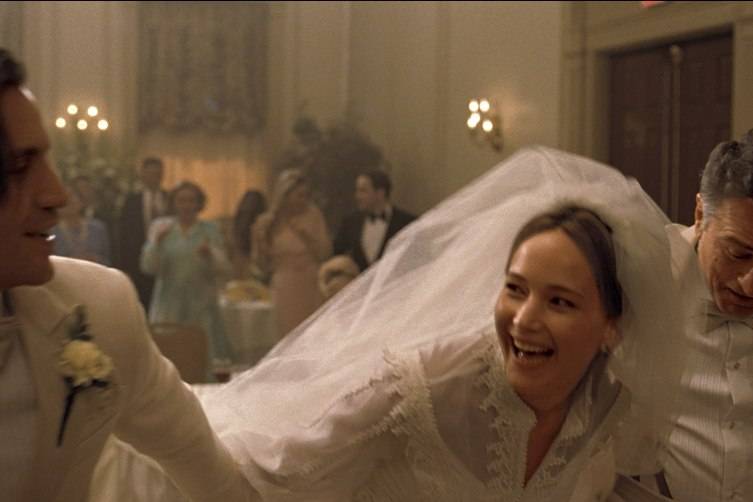
Lawrence must have inspired the director in some way. Though he always features strong women in his films, Joy is the first film he’s done with a female protagonist. “Starting with The Fighter, women characters started to become increasingly central to [my] films,” he says. “With every single film, women were the secret weapon; the important essence of the film. I knew that I had to make a film where a woman or women was at the center of it.”
In Joy, there are many. In addition to Lawrence’s character, there is Diane Ladd playing her “unanxious” grandmother Mimi; and Virginia Madsen as Joy’s mother, Carrie, a woman who isn’t strong herself, but is inspired by the powerful women she sees on soap operas.
Russell, who wrote the film’s script, looked to a very familiar place for inspiration: his own mother, Maria, a one-time secretary at Simon & Schuster. “I watched my mother try to get back into the workforce, and she was extremely frustrated. She had dropped out of college and she was unable to [go back to work]. That Joy is an inspirational figure who won’t take no for an answer and found her way, was funny, heartbreaking and inspiring to me.”
He gives props to Robert De Niro for playing Joy’s father Rudy in the biographical dramedy. “He’s the greatest actor of our time, I think, and I also think he is extremely generous and humble in what he’s willing to give and do,” Russell gleams. “He will get on set and he’s right in it with everyone else, no matter their age.”
Russell isn’t worried that De Niro is the film’s antagonist—a loving man who, in real life, helped Joy achieve her goal but also became her major adversary and biggest obstacle. “He made a complicated character loveable,” the director notes. “Robert’s performance is a gift, because it helped to make her rise: [Joy] had to fight him and be nurtured by him. She must step over him. It’s a Cinderella story without a prince.”
THE ENDLESS PURSUIT OF HAPPINESS
To date, David O. Russell has fallen short of claiming the elusive prize that is the Academy Award. He has been nominated five times: three for best direc- tor (The Fighter, Silver Linings Playbook and American Hustle), one for best original screenplay (American Hustle) and one for best adapted screenplay (Silver Linings). Does he want to win? Maybe. But does an Oscar on his mantle mean everything to him? Hardly.
“I think [the Academy Awards are] good for cinema; [The ceremony] makes people excited about cinema. It’s helped us take these movies about people—they don’t have wild special effects, they’re not comedies, they don’t have a lot of violence—and reach a wide audience,” he says diplomatically. “It’s special to be able to do it, and not easily done, to make movies about human hearts and souls and all their imperfections in ways that are going to challenge audiences. Whether you win or not, it helps people discover your film, and they can decide for themselves how they feel about it; it gets their attention.
“Also,” he adds, “Robert De Niro told me ten years ago ‘It’s nice to be part of it, but you shouldn’t get too caught up in it.’ It’s not why we make movies: we make movies to tell stories and to reach people’s hearts.”
While most people wear their hearts on their sleeves, Russell leaves his on the screen, imprinted on each of his movies. “My heart is all over every film,” he declares. “The love in it, the trouble in it, the voice in it. As [legendary director] Elia Kazan once said, ‘What would a director do for a film? You must be prepared to do everything and give everything.’”
Russell definitely does that, and while not all of the experiences have been favorable, he swears that all have made for some pretty stellar memories.
He tells the story of how, at the beginning of his film career, he ran into the late Robert Altman at the Cannes Film Festival. He wanted to know which of Altman’s own films was the acclaimed director’s personal favorite. “He said, ‘They’re like my children. How can I tell you which child I love more? I can’t do that,’” Russell recalls. “I didn’t understand at the time, because I knew my favorite [Altman] films and I was happy to tell him,” he says with a chuckle.
Now, two decades later as a Hollywood veteran, Russell finally gets what Altman was saying. “I understand it now. I love [all of my films for] different reasons. It’s part of the adventure of life, and of being a filmmaker. I look back on certain movies that I thought were very trying and challenging, and they become [my] favorite memories. It’s part of the mystery of life. You can’t have joy without having scars and experience that you’ve paid for with your own sweat and blood—they go together.”







